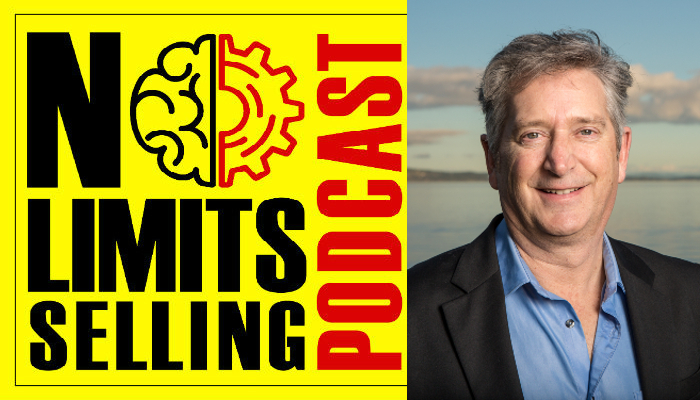The Art of Prospecting by Barry Andruschak
On Episode 31 of The No Limits Selling Podcast, we have Barry Andruschak, National Sales Director at Primerica. Barry discusses the art of prospecting, which he defines as putting names on a list. He suggests starting with close friends, family, business associates, and classmates.
Podcast Highlights:
- Your beliefs drive performance
- There are 4 types of markets
- Focus on Analytics to be successful

Contact Barry:
[EDITOR’S NOTE: This podcast is sponsored by No Limits Selling. It is a fun, fast-paced podcast that delivers hard-fought business advice that you can implement today to improve your sales and performance]
Interested In Our Real Estate Coaching Services? Explore Our Website: Link
Feeling Not Well Today? You Can Use Our Mindset Boosters App To amp Up Your Mood: Link
Find us on Social Media:
LinkedIn | Facebook community | Instagram
Like what do you listen to? Subscribe to our podcast!
Ready to become fearless? We can help you become fearless in 60 days so you accomplish more in your career Schedule A 15 min Call with Umar
Summary
Introduction and Guest Background
The podcast is hosted by Umar Hameed and features guest Barry Andruschak, author of the book "Setting Appointments Made Easy". Barry is an introvert who has found success in sales, and he shares his strategies and tips for setting appointments and making sales.
Importance of Appointments in Sales
Barry emphasizes the importance of appointments in the sales process. He argues that even if you have the best product or service in the world, it's almost pointless if you can't get an appointment or get anyone to listen to you. Appointments are everything in sales.
Identifying the Market
Barry explains that he identifies his market in four different ways: hot market, warm market, cold market, and cool market. He explains that a cold market is nothing more than people you have nothing in common with, strangers, or people that you don't know or people that you've made mad. A cool market prospect is someone you have something in common with.
Art of Prospecting
Barry discusses the art of prospecting, which he defines as putting names on a list. He suggests starting with close friends, family, business associates, and classmates. He believes that each person knows at least 450 people and has the buying influence on five or six other people. Therefore, if you can make a friend with a person and they like what you do, they'll refer you on to other people, expanding your market.
Making the Call
Barry shares his approach to making calls. He emphasizes the importance of warming people up on the phone and causing them to want to see you. He suggests using phrases like "Are you locked in?" or "Are you open to suggestions?" to engage the person on the other end of the line and make them more receptive to what you have to say.
Confidence Boosting Techniques
Barry discusses the importance of confidence in making sales calls. He suggests that salespeople need to learn their lines, much like actors, to be successful. He also emphasizes the importance of tonality and making a positive impression in the first few seconds of a call.
Conclusion
In conclusion, the podcast features Barry Andruschak, a successful salesperson and author, who shares his insights on the importance of appointments in sales, identifying markets, prospecting, and making effective calls.
He categorizes markets into hot, warm, cold, and cool, and emphasizes the significance of warming up prospects during calls. Barry also highlights the role of confidence in sales, suggesting that salespeople should learn their lines like actors and pay attention to their tonality.
Questions & Answers
Who is Barry Andruschak and what does he specialize in?
Why are appointments important in sales according to Barry Andruschak?
How does Barry Andruschak categorize markets?
What is Barry Andruschak's approach to prospecting?
What techniques does Barry Andruschak suggest for making effective sales calls?
How does Barry Andruschak boost confidence in sales calls?
What is the purpose of Barry Andruschak's book "Setting Appointments Made Easy"?
How can I improve my sales skills as an introvert?
Don’t miss this opportunity to transform your real estate career with one-on-one coaching. As an experienced real estate coach, I, Umar Hameed, am dedicated to helping you unlock your full potential and achieve your real estate goals. To learn more about who am I and my clients ↓
If you’re ready to take the next step, book an appointment with me today and begin your journey toward success in the real estate industry.
